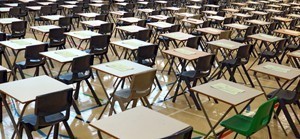SchoolExam time is upon us again.
time is upon us again.
Lots of stressed out teenagers sat at small desks in gyms and halls across the country feeling like every word they write will determine the course of the rest of their life.
But what does exam time mean in terms of preparedness and resilience?
Well it changes how we do our business quite significantly. All of a sudden we have a whole new set of considerations we need to plan for.
Firstly we have mixed up our usual peer groups so we need to be accounting for them differently in the event of an evacuation, like for a fire alarm. All our usual assembly areas will have changed too so any rehearsals or drills we have previously carried out are now void. It may be that we should consider adding an evacuation brief to the normal exam preamble about not talking and being escorted to the loos.
Next we only have one set of the relevant exam papers which we open on the day of the exam when we hand them out. What do we do if they are damaged or destroyed?
We are also probably using different facilities. We love to put them all in the gym or the hall where we can keep an eye on them at once, and we need less invigilators that way. But what do we do if we can’t use that facility. Do we have a plan to use other classrooms? If they are en-bloc to the hall or gym they might be unavailable too. But the exam has to happen at that date and time to prevent cheating! What are we going to do? Now we are in multiple smaller classrooms rather than one big hall we need more invigilators, who are they and how will we get hold of them?
Beyond ‘logistics’: building reputation management and psychosocial resilience
What about our reputation? What does it say about us if we get this wrong? A good friend of mine always says “Just imagine the headline”. As a professional organisation we have to get this right. Relations between students, parents and school can be a challenge at the best of times. Not to mention maintaining our image in the community. Every crisis is actually an opportunity. Managing any disruptions during exam time will really set us above the pack!
Finally what about our consideration of psychosocial resilience. Our young people are going through what is probably the most stressful experience they have ever had in their lives to date. ChildLine and the Samaritans always report a significant spike in calls from young people at this time of year. A recent survey by ChildLine said that a worrying 64% of their 1300 respondents stated they have never received any support in dealing with exams. Even more worryingly these same respondents said they dealt with exam stress by smoking, taking drugs and self-harming. Sadly, for some it is all too much and results suicide. We should be looking to the psychosocial welfare of everyone in our school communities, but we should be making even more efforts during exam time.
What we need is a set of contingency plans specifically for exam time that sit as part of our Crisis and Continuity planning. The young people sitting these exams are suffering from enough stress without the uncertainty of being unable to actually sit their exam or have it disrupted. They are the future after all and we have a duty to give them the best support we can.
Ben O’Toole
Tweet
thank you for sharing, raising awareness for School Resilience and Emergency Preparedness!
This article was written before the latest headline hit Bomb threats across UK schools on GCSE exam day as caller vows to ‘behead children’ For more information on practical tools for school preparedness and resilience visit evaq8.co.uk/schools
#Canterbury school evacuation: 240 students were sitting a GCSE English exam at the time 2/2
— BBC Radio Kent (@BBCRADIOKENT) May 23, 2016
Newham sixth form college evacuated after ‘hoax’ bomb threat in peak exam time https://t.co/yQx32EnS4K pic.twitter.com/9seP0JXqwH
— Evening Standard (@standardnews) May 18, 2016




